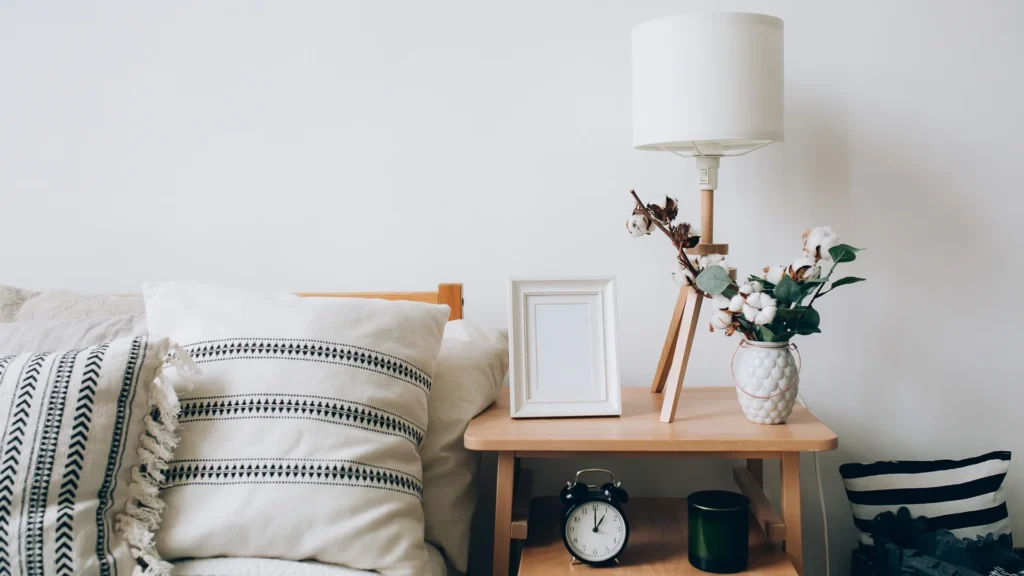A rejuvenating night’s sleep is the cornerstone of health and well-being, vital for recharging the body and mind. Yet, many grapple with sleep issues like insomnia, unaware that the key to improved slumber lies in healthy habits. Embracing these practices can transform nights of tossing and turning into mornings of waking up refreshed and ready to tackle the day.
Today, we will look at 11 effective habits that promise to enhance sleep quality. Each habit will be explored in depth, offering practical insights to help you drift off into a peaceful slumber effortlessly night after night.
1. Stick to a Consistent Sleep Schedule

Do you often find yourself tossing and turning at night, struggling to fall asleep? Or perhaps you wake up feeling groggy and unrefreshed? This may be due to an inconsistent sleep schedule. Creating a regular sleep routine is one of the first steps towards improving your sleep quality and dealing with issues like insomnia.
The Importance of a Consistent Sleep Routine
Having fixed bedtime and wake-up times trains your body to follow a natural sleep-wake cycle, also known as a circadian rhythm. When this cycle is in sync with external signals like daylight and darkness, it becomes easier for you to fall asleep at night and wake up refreshed in the morning.
Why Consistency Matters
If you’re aiming for better sleep, sticking to a consistent sleep schedule is crucial – even on weekends or holidays! While sleeping in might sound tempting, it can disrupt your body’s internal clock, making it harder for you to maintain a regular sleep pattern during the rest of the week.
“Consistency is key when it comes to establishing healthy sleep habits.“
How to Establish a Consistent Sleep Routine
Here are some practical tips to help you establish a consistent sleep routine:
- Set a bedtime alarm: We often set alarms to wake up in the morning but setting one for bedtime can be just as useful. This reminds you when it’s time to start winding down for the night.
- Create a relaxing pre-bed ritual: This could be anything from reading a book to practicing deep breathing exercises. The goal is to signal your body that it’s time to relax and prepare for sleep.
- Avoid napping too close to bedtime: While naps can help make up for lost sleep, taking them too late in the day can interfere with your nighttime sleep. Aim to keep naps early in the afternoon and limit them to 30-45 minutes.
Remember, consistency is key when it comes to establishing healthy sleep habits. So, why not start tonight?
2. Create a Relaxing Sleep Environment

Transforming your bedroom into a sleep-friendly environment can significantly enhance the quality of your rest and combat insomnia. Here’s how to optimize your space for maximum relaxation:
Optimize Your Space
- Keep it cool: A slightly cool room temperature helps lower your body’s core temperature, which is a signal for it to start shutting down for the night.
- Embrace the dark: Use blackout curtains or a sleep mask to block out any light that could interfere with your body’s natural sleep-wake cycle.
- Seek silence: If noise is an issue, consider earplugs or a white noise machine to maintain a quiet atmosphere conducive to sleeping.
Upgrade Your Bedding
Investing in your bedding can also have a profound impact on sleep quality. Consider these upgrades:
- Mattress matters: Ensure your mattress provides the right balance of comfort and support for your body.
- Pillows for posture: Choose pillows that align with your sleeping position and personal preferences for firmness.
- Quality linens: Soft, breathable sheets can make slipping into bed feel like a luxury experience each night.
Wind Down Routine
Before bedtime, engage in calming activities to signal your body that it’s time to wind down:
- Read to relax: Diving into a good book allows you to escape daily stresses and immerse yourself in another world.
- Warm bath benefits: The rise and subsequent fall of body temperature post-bath can prompt drowsiness, preparing you for sleep.
Creating an inviting, tranquil bedroom environment sets the stage for restful slumber. With these strategies in place, transitioning from day to night becomes a seamless, soothing process.
Read More: How to Create a Sleep-Friendly Bedroom Environment
3. Improve Your Sleep with Healthy Eating Habits

The food and drinks you consume can have a big impact on your sleep quality. It’s not just about avoiding caffeine or heavy meals before bedtime; it’s about developing Healthy Eating Habits that promote Sleep Quality and may even lower the risk of Insomnia.
How Your Diet Affects Your Sleep
Choosing the right foods can help regulate your sleep-wake cycle and improve overall sleep health. Here are some important points to remember:
1. Balance Your Diet
Aim for a balanced diet that includes:
- Fruits
- Vegetables
- Whole grains
- Lean proteins
These foods provide essential nutrients that support sleep, such as magnesium (which aids in muscle relaxation) and B vitamins (which help regulate melatonin production).
2. Pay Attention to Tryptophan
Tryptophan is an essential amino acid that plays a role in sleep regulation. It helps produce serotonin, which is then converted into melatonin — the hormone that controls your sleep-wake cycle.
Include tryptophan-rich foods in your meals, such as:
- Turkey
- Chicken
- Pumpkin seeds
- Soy products
- Dairy products
Bedtime Snack Ideas for Better Sleep
If you find yourself hungry before bed, choose light snacks that contain both carbohydrates and tryptophan. These combinations can promote relaxation and make you feel sleepy. Here are two simple ideas:
- A small turkey sandwich on whole-grain bread: This snack provides a mix of carbs and tryptophan, helping you feel more tired.
- A banana with almond butter: Enjoy this duo for a dose of carbs and magnesium — a mineral known to improve sleep quality.
Remember, making healthy food choices isn’t just important for your daytime well-being; it also impacts your ability to get a good night’s sleep. By adopting these dietary habits, you’re not only fueling your body but also creating an environment conducive to quality rest.
Read More: How to Eat to Lose Weight in Just 7 Easy Steps
4. Make Exercise a Regular Part of Your Day

Incorporating exercise into your daily routine can significantly enhance sleep quality and improve mood. While physical activity is a powerful ally against insomnia, timing is key. Engage in stimulating workouts several hours before bedtime to avoid disrupting your sleep with a surge of energy. An ideal approach involves:
- Scheduling vigorous activities such as running or cycling earlier in the day, allowing the body ample time to wind down by nightfall.
- Choosing milder forms of exercise, like gentle stretching or yoga, if you prefer moving closer to bedtime. These can help relax the body without overstimulation.
Certain exercises have gained recognition for their sleep-promoting benefits. To harness these advantages:
- Consider yoga: The combination of mindful breathing and gentle movements in yoga can reduce stress, which often hinders a restful night’s sleep.
- Try brisk walking: This moderate aerobic exercise boosts heart health and mood during the day, setting the stage for better sleep at night.
By integrating regular physical activity into your lifestyle, you support your body’s natural sleep rhythm and foster an environment conducive to restorative rest.
Read More: Running vs Walking: Which Is Better for Weight Loss?
5. Wind Down with Relaxation Techniques

Engaging in relaxation techniques each evening is a cornerstone of managing stress and setting the stage for restful slumber. For those wrestling with insomnia or simply seeking to enrich their pre-sleep routine, these practices can be transformative.
Deep Breathing Exercises
A fundamental yet powerful tool, deep breathing not only calms the nervous system but also reduces stress levels, which can lead to improved sleep quality. Try the 4-7-8 technique—inhale deeply for four seconds, hold the breath for seven seconds, and exhale slowly for eight seconds. Repeat this cycle four times.
Progressive Muscle Relaxation
This involves tensing and then relaxing different muscle groups in sequence. Start from the toes and work upwards to the head or vice versa. Tense each muscle group for five seconds then relax for 30 seconds, noticing the contrast between tension and relaxation.
Mindfulness Meditation Journey
Embark on a journey of mindfulness meditation with these steps:
- Lie down comfortably in your bed and close your eyes.
- Focus on your breath, noticing how your chest and abdomen rise and fall with each inhalation and exhalation.
- Acknowledge any thoughts that come to mind without judgment and gently guide your focus back to your breathing.
- Envision each part of your body relaxing one by one, starting at your feet and moving upward.
- Continue this process until you reach a state of complete relaxation.
By incorporating these relaxation techniques into your nightly routine, you create an oasis of calm that invites restorative sleep. As you transition from this serene mindset to embrace healthier habits further, remember that every step taken is a building block towards achieving better sleep hygiene and overall wellness.
6. Limit Screen Time Before Bed

Exposing yourself to the bright blue light emitted by screens on your phone, tablet, or computer before going to bed can make it harder for you to fall asleep. This type of light tricks your brain into thinking that it’s still daytime, which reduces the production of melatonin—a hormone that helps regulate sleep. The result? Trouble sleeping and a messed-up sleep schedule.
Here are some things you can do to minimize these effects and prepare yourself for sleep:
The Digital Detox Routine
- Decide on a time to unplug: Make it a point to turn off all your gadgets at least 60 minutes before you plan on sleeping.
- Keep devices out of your bedroom: This removes the temptation to check your phone if you wake up in the middle of the night.
Sleep-Friendly Activities
Instead of spending time on social media or watching TV shows late at night, try these alternatives that promote better sleep:
- Read a physical book: Choose something easy or uplifting that can help calm your mind.
- Listen to relaxing music: Pick songs with a slow rhythm and soothing tunes.
- Write in a gratitude journal: Take a moment to think about the good things from your day, which can make you feel more peaceful and satisfied.
By following these habits, you create an atmosphere that encourages deep sleep. Going from being awake during the day to resting at night turns into a meaningful routine that tells your body it’s time to unwind.
7. Managing Stress for Better Sleep

Stress and sleep have a strong impact on each other. When stress levels are high, it can result in difficulty falling asleep or staying asleep. Likewise, when sleep quality is poor, it can increase feelings of stress. This cycle can lead to insomnia if not addressed.
Ways to Reduce Stress
Here are a few strategies that may help reduce your stress levels:
- Yoga: This ancient practice combines physical postures, breathing exercises, and meditation to promote mental and physical relaxation. Regular yoga practice can help lower stress levels, making it easier for you to fall asleep at night.
- Seeking Support: Don’t underestimate the power of talking things out with someone you trust. Sharing your worries and concerns with a friend or family member can provide relief and support.
- Addressing Issues: A positive sleep environment involves more than just a comfy bed and quiet surroundings. It also means resolving any ongoing problems or conflicts that are causing stress. Finding ways to address these issues – whether through communication, seeking professional help, or practicing healthy coping mechanisms – can create a sense of peace before bedtime.
Remember, managing stress is not just about improving sleep; it’s also about enhancing overall well-being. So, take time each day to unwind, relax, and let go of the stressors that may be hindering your path to restful sleep.
Read More: Did You Know These 7 Reliable Techniques To Managing Stress?
8. Improve Your Sleep Habits and Bedroom Setup

If you want to sleep better, it’s important to look closely at your sleep habits and how you’ve set up your bedroom. Here are some steps you can take:
Evaluate Your Sleep Habits with a Sleep Diary
Not sure where to start? Consider keeping a sleep diary. Write down when you go to bed, when you wake up, and if you wake up during the night. Pay attention to things like late-night snacks, screen time, or stress that might be affecting your sleep. This self-observation can help you see patterns that are impacting your sleep quality.
Create a Peaceful Bedroom Environment
Your bedroom should be a place reserved for sleeping. To create a better sleep environment:
- Remove electronics and work-related items from your bedroom. This will help strengthen the association between your bed and sleep, separating it from daytime activities that can keep your mind awake.
- Control noise as much as possible. Even small noises can disturb your sleep. If you live in a noisy area or have a partner who snores, try using earplugs or a white noise machine to block out the sound.
- Keep the room cool. The ideal temperature for sleeping is around 65 degrees Fahrenheit (18 degrees Celsius).
- Make the room as dark as possible. Consider using blackout curtains or an eye mask.
Invest in Comfort
Having a comfortable mattress and pillow can make a big difference in how well you sleep. If yours aren’t up to par, it might be worth considering investing in new ones.
Remember, improving your sleep doesn’t have to be overwhelming. Making small changes in these areas can lead to big improvements in the quality of your rest. So why not start tonight?
9. Seek Professional Help If Needed

Experiencing challenges with sleep despite putting in place numerous healthy habits can be disheartening. When persistent insomnia refuses to budge, it might be time to consider seeking Professional Help. There’s no need for stigma or feelings of inadequacy; reaching out is a proactive step towards better health.
- Recognize the Signs: If you find yourself lying awake night after night, and your daily life is affected by fatigue and concentration issues, these are clear signals that professional intervention may be beneficial.
- Consult a Healthcare Provider: Scheduling an appointment with a doctor can open up new avenues for treatment. They might suggest cognitive-behavioral therapy (CBT) for insomnia, prescription medications, or further evaluations to rule out underlying conditions.
- Explore Your Options: Keep in mind that there are specialists, such as sleep psychologists and psychiatrists, who focus on sleep disorders. They can offer tailored strategies and support systems to help you conquer insomnia.
Remember that asking for help is a sign of taking control of your sleep health, not surrendering to the problem. By consulting a professional, you’re equipping yourself with expert knowledge and additional tools to enhance your nighttime rest.
10. Don’t Let Insomnia Define You
Cultivating a Positive Mindset plays a crucial role in confronting the challenges of Insomnia. It’s essential to remember that the quality of your sleep isn’t a measure of your self-worth. Individuals grappling with sleep disturbances often feel isolated in their experience, yet many share this struggle and have navigated through it successfully.
- Empowerment through Personal Stories: Take inspiration from those who have stood where you are now and emerged triumphant. Their journeys highlight the effectiveness of an all-encompassing approach—embracing lifestyle modifications, therapeutic interventions, and sometimes medication under professional guidance.
- Self-Compassion Is Key: Be gentle with yourself, acknowledging that progress is a series of steps rather than a sprint to the finish line. Recognize small victories along the way, such as feeling more rested or simply having a better understanding of your sleep patterns.
- Resilience Over Resolution: Understand that overcoming insomnia is not just about ‘fixing’ the issue but building resilience against it. The aim is to develop strategies that make you less vulnerable to sleepless nights and more capable of bouncing back when they occur.
By fostering a resilient and compassionate mindset, you can disarm the power that insomnia may hold over your life. Remember, seeking help is a strength, not a weakness, and with each step forward, you’re paving the way toward restful nights and brighter days.
Read More: Understanding Motivation: And How to Soar to New Heights
11. Embrace Acceptance and Commitment Therapy for Insomnia (ACT-i)
When it comes to insomnia treatment, a cutting-edge approach that’s been making waves recently is Acceptance and Commitment Therapy for Insomnia (ACT-i). This innovative sleep therapy merges mindfulness techniques with behavioral strategies to manage sleepless nights effectively.
What is ACT-i and How Does It Work?
ACT-i operates on the principle of “psychological flexibility”. The therapy encourages individuals to accept their thoughts and feelings about sleep rather than fight them. This shift in perspective can reduce stress around insomnia and pave the way for healthier sleep habits.
The Effectiveness of ACT-i in Improving Sleep Quality
Research underscores the effectiveness of ACT-i in improving sleep quality. A study published in Sleep Medicine found that individuals who underwent ACT-i experienced significant reductions in both nighttime wakefulness and psychological distress.
An ACT-i Exercise You Can Try at Home: “Leaves on a Stream” Visualization
Let’s delve into a practical ACT-i exercise you can try at home: the “Leaves on a Stream” visualization. Here’s how it works:
- Visualize a slow-moving stream with leaves floating on its surface.
- As thoughts come up, place each one on a leaf.
- Watch as your thought – now on a leaf – floats away downstream.
- If your thoughts start to speed up, imagine the stream slowing down.
- The goal isn’t to empty your mind, but to observe your thoughts without getting caught up in them.
This visualization can help you detach from racing thoughts at bedtime, promoting relaxation and readiness for sleep.
FAQ
Q1: What is the importance of having a consistent sleep schedule?
A: A consistent sleep schedule aligns your body’s internal clock and promotes better sleep quality. This means sticking to the same bedtime and wake time every day, even on weekends.
Q2: How can I create a relaxing sleep environment?
A: Optimizing your space, upgrading your bedding, and establishing a wind-down routine can all contribute to a more conducive sleep environment.
Q3: How does diet affect sleep?
A: Certain foods and drinks can disrupt your sleep, including caffeine and alcohol. Eating heavy meals close to bedtime can also interfere with the body’s process of winding down for sleep.
Q4: What role does exercise play in promoting good sleep?
A: Regular physical activity can help you fall asleep faster and enjoy deeper sleep. It’s best to finish exercising at least three hours before bed to give your body enough time to wind down.
Q5: Why should I limit screen time before bed?
A: The light emitted by screens interferes with your body’s production of melatonin, the hormone that regulates your sleep-wake cycle.
Q6: How can I manage stress for better sleep?
A: Techniques like deep breathing exercises, progressive muscle relaxation, mindfulness meditation journey may help reduce stress levels and promote better sleep.
Q7: What if these methods don’t work for me?
A: If these methods don’t work for you, it may be beneficial to seek professional help. You could also try techniques like ACT-i (Acceptance and Commitment Therapy for Insomnia) which operates on the principle of “psychological flexibility”.


